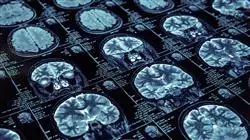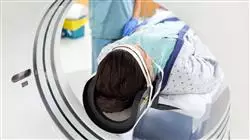University certificate
Scientific endorser

The world's largest faculty of medicine”
Introduction to the Program
Take the opportunity to learn about the latest advances in the Diagnostic Management of Brain Tumors, and increase your competence with patients"

In this way, we analyze the diagnostic and therapeutic management of both primary and metastatic brain tumors. We will discuss current technologies used for the resection of gliomas, such as awake craniotomy, fluorescence-guided surgery, neuronavigation, neuroendoscopy, among many others.
Another advance that we will see extensively comes from the hand of genomics whose advances have made it possible to learn that more than half of pediatric brain tumors have genetic abnormalities that could help in diagnosis or treatment, which is reflected in the recent decision of the World Health Organization to classify such tumors by genetic alterations, rather than by tumor type. Thus, precision medicine for pediatric brain tumors is now a reality, and possibly in the near future also for adult brain tumors.
Finally, another topic that we will analyze in the Postgraduate diploma, to highlight some relevant ones, and which is gaining ground in other tumors, is immunotherapy. Immunotherapy has shown promise for the treatment of glioblastoma multiforme. This is because glioblastoma multiforme exhibits powerful adaptive capabilities, a relative lack of immunogenicity, an immunosuppressive tumor microenvironment and intratumoral heterogeneity. Therefore, experts agree that immune-targeted therapies are likely to play a central role in improving the durability of treatment. To date, clinical trials of several vaccine therapies using autologous tumor antigens or specific tumor-associated antigenic peptides with adjuvants have been conducted to treat patients with high-grade gliomas. Therefore, immunotherapy, especially combination therapy, may be a promising strategy for the treatment of patients with brain tumors.
In short, many concepts are currently being investigated that we hope will have a positive influence on the therapeutic treatment of metastatic and primary tumors of the central nervous system, and which we will present since many have already been integrated into routine clinical practice and others will soon form the panoply of options in the broad diagnostic or therapeutic arsenal that we have today.
Update your knowledge through the Postgraduate diploma in Diagnostic Management of Brain Tumors"
This Postgraduate diploma in Diagnostic Management of Brain Tumors contains the most complete and up-to-date scientific program on the market. The most important features include:
- More than 75 clinical cases presented by experts in Diagnostic Management of Brain Tumors
- The graphic, schematic, and eminently practical contents with which they are created provide scientific and practical information on the disciplines that are essential for professional
- Latest diagnostic and therapeutic developments on evaluation, diagnosis and intervention in Diagnostic Management of Brain Tumors contains practical exercises to perform the self-assessment process to improve learning
- Iconography of clinical and diagnostic imaging tests
- An algorithm-based interactive learning system for decision-making in the clinical situations presented throughout the course
- With special emphasis on evidence-based medicine and research methodologies in Diagnostic Management of Brain Tumors
- All of this will be complemented by theoretical lessons, questions to the expert, debate forums on controversial topics, and individual reflection assignments
- Content that is accessible from any fixed or portable device with an Internet connection
This Postgraduate diploma may be the best investment you can make in the selection of a refresher program for two reasons: in addition to updating your knowledge of Diagnostic Management of Brain Tumors, you will obtain a qualification from TECH Global University"
Its teaching staff includes professionals in the field of Diagnostic Management of Brain Tumors, who bring to this training the experience of their work, in addition to recognized specialists belonging to leading scientific societies.
The multimedia content developed with the latest educational technology will provide the professional with situated and contextual learning, i.e., a simulated environment that will provide an immersive training program to train in real situations.
This program is designed around Problem Based Learning, whereby the physician must try to solve the different professional practice situations that arise during the course. For this purpose, the physician will be assisted by an innovative interactive video system created by renowned and experienced experts in the field of Diagnostic Management of Brain Tumors with extensive teaching experience.
Increase your decision-making confidence by updating your knowledge through this Postgraduate diploma"

Take the opportunity to learn about the latest advances in Diagnostic Management of Brain Tumors and improve patient care"
Why study at TECH?
TECH is the world’s largest online university. With an impressive catalog of more than 14,000 university programs available in 11 languages, it is positioned as a leader in employability, with a 99% job placement rate. In addition, it relies on an enormous faculty of more than 6,000 professors of the highest international renown.

Study at the world's largest online university and guarantee your professional success. The future starts at TECH”
The world’s best online university according to FORBES
The prestigious Forbes magazine, specialized in business and finance, has highlighted TECH as “the world's best online university” This is what they have recently stated in an article in their digital edition in which they echo the success story of this institution, “thanks to the academic offer it provides, the selection of its teaching staff, and an innovative learning method aimed at educating the professionals of the future”
A revolutionary study method, a cutting-edge faculty and a practical focus: the key to TECH's success.
The most complete study plans on the university scene
TECH offers the most complete study plans on the university scene, with syllabuses that cover fundamental concepts and, at the same time, the main scientific advances in their specific scientific areas. In addition, these programs are continuously being updated to guarantee students the academic vanguard and the most in-demand professional skills. In this way, the university's qualifications provide its graduates with a significant advantage to propel their careers to success.
TECH offers the most comprehensive and intensive study plans on the current university scene.
A world-class teaching staff
TECH's teaching staff is made up of more than 6,000 professors with the highest international recognition. Professors, researchers and top executives of multinational companies, including Isaiah Covington, performance coach of the Boston Celtics; Magda Romanska, principal investigator at Harvard MetaLAB; Ignacio Wistumba, chairman of the department of translational molecular pathology at MD Anderson Cancer Center; and D.W. Pine, creative director of TIME magazine, among others.
Internationally renowned experts, specialized in different branches of Health, Technology, Communication and Business, form part of the TECH faculty.
A unique learning method
TECH is the first university to use Relearning in all its programs. It is the best online learning methodology, accredited with international teaching quality certifications, provided by prestigious educational agencies. In addition, this disruptive educational model is complemented with the “Case Method”, thereby setting up a unique online teaching strategy. Innovative teaching resources are also implemented, including detailed videos, infographics and interactive summaries.
TECH combines Relearning and the Case Method in all its university programs to guarantee excellent theoretical and practical learning, studying whenever and wherever you want.
The world's largest online university
TECH is the world’s largest online university. We are the largest educational institution, with the best and widest online educational catalog, one hundred percent online and covering the vast majority of areas of knowledge. We offer a large selection of our own degrees and accredited online undergraduate and postgraduate degrees. In total, more than 14,000 university degrees, in eleven different languages, make us the largest educational largest in the world.
TECH has the world's most extensive catalog of academic and official programs, available in more than 11 languages.
Google Premier Partner
The American technology giant has awarded TECH the Google Google Premier Partner badge. This award, which is only available to 3% of the world's companies, highlights the efficient, flexible and tailored experience that this university provides to students. The recognition as a Google Premier Partner not only accredits the maximum rigor, performance and investment in TECH's digital infrastructures, but also places this university as one of the world's leading technology companies.
Google has positioned TECH in the top 3% of the world's most important technology companies by awarding it its Google Premier Partner badge.
The official online university of the NBA
TECH is the official online university of the NBA. Thanks to our agreement with the biggest league in basketball, we offer our students exclusive university programs, as well as a wide variety of educational resources focused on the business of the league and other areas of the sports industry. Each program is made up of a uniquely designed syllabus and features exceptional guest hosts: professionals with a distinguished sports background who will offer their expertise on the most relevant topics.
TECH has been selected by the NBA, the world's top basketball league, as its official online university.
The top-rated university by its students
Students have positioned TECH as the world's top-rated university on the main review websites, with a highest rating of 4.9 out of 5, obtained from more than 1,000 reviews. These results consolidate TECH as the benchmark university institution at an international level, reflecting the excellence and positive impact of its educational model.” reflecting the excellence and positive impact of its educational model.”
TECH is the world’s top-rated university by its students.
Leaders in employability
TECH has managed to become the leading university in employability. 99% of its students obtain jobs in the academic field they have studied, within one year of completing any of the university's programs. A similar number achieve immediate career enhancement. All this thanks to a study methodology that bases its effectiveness on the acquisition of practical skills, which are absolutely necessary for professional development.
99% of TECH graduates find a job within a year of completing their studies.
Postgraduate Diploma in Diagnostic Management of Brain Tumors.
Brain tumors are one of the most complex and challenging pathologies for diagnosis and treatment. Accuracy and speed of diagnosis are determining factors for the success of treatment and patient survival. For this reason, at TECH Global University we have designed a Postgraduate Diploma program in Diagnostic Management of Brain Tumors, which will provide health professionals with the necessary tools and knowledge to face this difficult task. Our online classes, led by experts in the field, allow students to access high quality training from anywhere and at any time. The flexibility and convenience of online classes allow students to follow the pace of the program at their own pace, while remaining engaged in their clinical practice.
Learn about the different types of brain tumors with this Postgraduate Diploma designed by TECH.
The program covers key topics such as radiology and neurology, providing a solid foundation in the anatomy and physiology of the brain and its circulatory and nervous systems. The different types of brain tumors, their classification and how to distinguish them on imaging will be covered. State-of-the-art diagnostic techniques and tools, such as biopsy and functional imaging, will also be addressed, and the latest advances in medical and surgical therapies will be discussed. Our program is designed for healthcare professionals seeking to specialize in the diagnosis and treatment of brain tumors, as well as those who wish to update their knowledge and skills in this constantly evolving area. With our Postgraduate Diploma in Diagnostic Management of Brain Tumors, students can advance their careers and make a difference in the lives of their patients.







